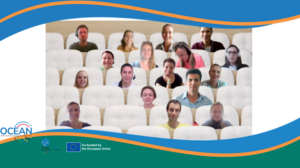Another event punctuated the OCEAN project agenda as on the 20th of September was held the first consortium call. This online meeting was led by the EOC EU office in order to establish a first feedback session on the different actions already initiated and provide an overview of upcoming tasks.
Looking forward to the next training courses and the future module provided to the Climate Action Officers, the date and speaker of the October sessions was shared. Lina Taylor, a former Olympian and currently Climate Coach will be in charge of this session.
Afterwards, the discussion moved to the expectations and challenges faced by the consortium members in the implementation of the carbon footprint measurement. Potential obstacles expressed revolved around the comprehensive approach of measurement which requires time and a specific methodology. However, at the end of the OCEAN Project, the Climate Action Officers will have sufficient knowledge and expertise to calculate the carbon footprint of their organization on their own.
The next step of the OCEAN project is scheduled to take place during the month of October with the beginning of the Module 2.2. In the meantime, Climate Action Officers will start the complete carbon footprint measurement of their organization, following the recommendations established during the 2nd Seminar by the Öko Institut.

On 22 February, 18 National Olympic Committees, the European Olympic Committees EU Office (EOC EU Office), the International Olympic Committee (IOC) and the Association of National Olympic Committees (ANOC) gathered in Brussels for the Kick-Off Meeting of the OCEAN Project.
OCEAN, which stands for “Olympic Committees of Europe Approaching Carbon Neutrality”, aims to empower National Olympic Committees (NOCs) to measure and reduce their carbon footprint and enhance good governance in the field of climate action within their NOCs. In order to assist NOCs in getting as near to carbon neutral as possible, the project seeks to create and offer training for "Climate Action Officers." Subsequently, the project's main objective is to assist partner NOCs in creating a customised strategy for carbon reduction following an assessment of their carbon footprint with the support of the German environmental research institute Öko-Institut.
The Kick-Off Meeting, on 22 February, was opened by EOC President Spyros Capralos, who highlighted the relevance of the OCEAN Project and the responsibility of the sports organisations to reduce their impact on the environment and take up the sport world’s responsibility to lead by example in the field of climate action.
A key theme throughout the newly-adopted EOC Strategic Agenda 2030 is sustainability. In his opening speech, President Capralos praised the project’s partners for showing that Europe as a continent is serious about taking climate action.
He said: “It is incredibly pleasing to see the attendance here today. It is a sign that we are all taking climate change seriously. It is a sign that we are all committed to tackling the issue.
“We must adapt to the new realities we are facing. We must make sure that as a movement our organisations and events are agile enough to respond to the challenges that come our way.”
“The mission of the Olympic Movement is ‘to make the world a better place through sport‘. So as well as being able to manage the risks and adapt, we also have a responsibility to help solve the world’s biggest challenges. There is no doubt that climate change is definitely one of them.”
“And there are two ways in which we can have a big impact on the environment. We must reduce the negative impact of the European Olympic Movement’s activities on climate and we must also use the power of the Olympic Movement to inspire others into taking positive action.”
Folker Hellmund, Director of the EOC EU Office, stated: “This project funded by the European Union will empower European NOCs by providing the necessary tools and skills to embark on the climate action journey. But the impact of the project will be global and eventually strengthen good governance in the field of climate action for sport organisations”.
